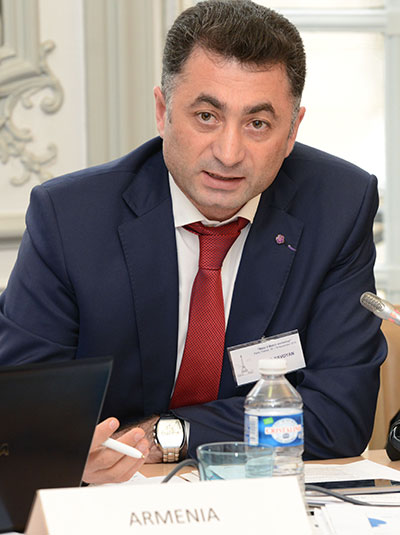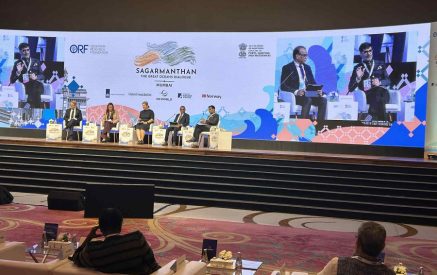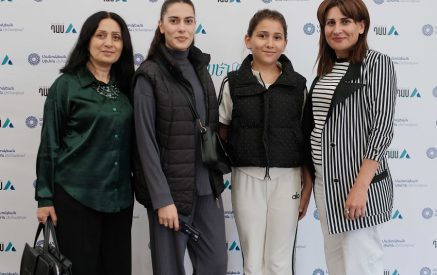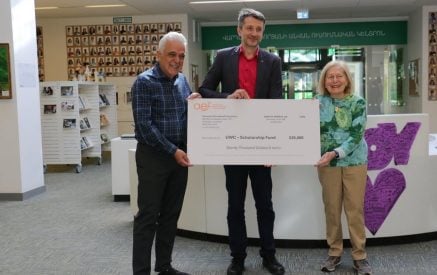The results of 6-years research work of the Vice-Rector of the French University of Armenia for coordination and quality of foreign relations and education programs, Arayik Navoyan, are already available. Recently, he defended his doctoral dissertation at the University of Descartes, France, on the theme “Higher education management and quality assurance in the higher education system of Armenia. In the context of recent reform of the Soviet legacy: the Bologna Process”. The Commission evaluated the work as “very good”.
The author notes that during the evaluation of the work, the preference is given to the use of classic English, French and Russian literature for one context and dominance of practical component to some extent was noted as a drawback. “This was due to the fact that the inner person could not keep a distance. Hence, this was both an advantage and disadvantage,” said Navoyan. The author of the scientific work argues that the comprehensive theme unites several concepts: management of higher education, quality of higher education, quality assurance and quality assurance as an instrument of regulation. The Vice-Rector of the French University notes that as far as he knows, there is no such a research in Armenia. He says that among other issues, his scientific research highlights the quality provision as a compound of public regulatory policy and the quality assurance matters, it was observed what toolset should the state use to regulate the higher education more effectively.
Mr. Navoyan notes, “Our center for Quality Assurance was created but the objectives and the toolsets were not defined from the onset, as well as what should be done with the results obtained.” He adds the accreditation procedure in the last three years has been amended for about 50 times, which is a result of the policy approaches not being defined from the onset and a situation is created when the higher education system is unable or does not trust the quality assurance, while there should be a consensus in a sense. The author of the research says that there are contradictions also between the “Law on Higher and Postgraduate Education” and the accreditation procedure. The law enshrines that the universities are accredited if 75% of specialties are accredited, and the accreditation of professions and program in the accreditation procedure is not mandatory.
Our interlocutor assures that the higher education in Armenia in the context of structure is good but the snapshot is different in the contextual sense. Having this in mind, Arayik Navoyan’s work focused on presentation, formation and outcomes of specific programs. The author argues that the research available hitherto regarding the situation of the education system are mainly the reports ordered by the international organizations prior to the reforms, there are also studies that were written without being thoroughly examined, the international reviews on quality assurance in Armenian language are very few. During our conversation, we also talked about public and non-public higher education facilities.
Arayik Navoyan states that 74 percent of state universities are funded by tuition fees and irrespective to the founder of the university, there should be clearly formulated and enshrined standards and terms. “Today, there is no standard of which is a university or an institute, sometimes we come across to 150-member academies. We have about 35 non-public universities with about 10000 students, and the average number of our students is already very low.” Referring to the international experience, our interlocutor says that in advanced countries, such as in France, the universities are consolidated. Consolidation incurs from the demand of efficient use of resources and effective management, hence, it is a luxury to have branches and local universities in the regions that offer the same specialties.
Talking about the Bologna ministerial summit, Arayik Navoyan expressed an opinion that hosting it in Yerevan was very important for our country. “Thus, our efforts in this direction was summed up. In fact, the agenda in the structural sense has been exhausted in Armenia, Armenia is one of the pioneers… To the point, in small countries like ours, the greatest capital is the human resource, and the more we integrate into the international education area, the more we will take.” Back to his scientific work, the vice-rector for the French University added that after being translated, it will be presented to the academic community for discussion, and he too is not inclined to argue that he has said the absolute truth, simply the work is a kind of contribution in the sense of guiding, while a part of the approaches presented in the work is long ago successfully applied by the French University.
Gohar HAKOBYAN,
“Aravot” daily


























































